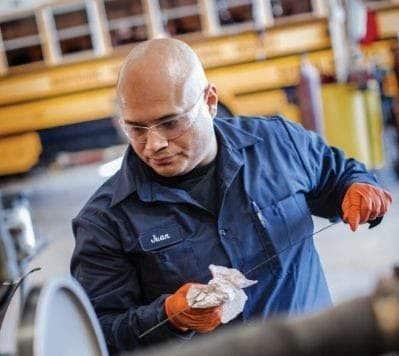Reduce School Bus Maintenance Time and Costs with Propane
Propane school buses provide a variety of benefits for school districts, students and communities. School buses operating on propane reduce transportation costs, provide safe transportation and reduce emissions. Propane buses also reduce school bus fleet maintenance time, repairs, and replacement costs.
The lower maintenance requirements of propane buses and more uptime on bus routes are two of the primary reasons propane school buses provide the lowest total cost-of-ownership compared to any fuel source throughout the 10 to 12-year lifespan of a school bus.
Propane Buses Require Fewer Time-Consuming Repairs and Costly Replacement Parts
Unlike diesel technology, propane does not require a complex emissions system, additional filters, or fluids to comply with the EPA’s clean air standards. Propane school bus fleets can avoid bus downtime and associated labor costs of continually cleaning diesel particulate filters.
In addition, with newer diesel engine design, idling for longer than five minutes has proven to cause premature failures of injectors, turbochargers, EGR valves and coolers, irregular-closed crankcase filters, and other non-warrantable repairs that can damage entire engine systems and put them out of service. Propane school buses are simple and easy to maintain. Unlike diesel engine technology, propane engines require a simple three-gas catalyst, similar to those in personal vehicles, and do not have limitations on idling.
Propane produces fewer emissions and has proven to reduce wear and tear on a school bus engine and its fuel system technology. Maintenance intervals on propane buses can be extended compared to the maintenance intervals of diesel buses, providing immediate savings on oil and filter changes.
The 3 F’s: Fluids, Filters and Fuel
The 3 F’s have a significant impact on a school bus fleet’s operations, maintenance, and repair budgets.
- Fluids – Propane school buses require fewer quarts of oil for operation. Oil changes are a perpetual maintenance cost that adds up quickly for a school district and even more so for a large bus fleet. For example, the Tippecanoe School Corporation (TSC) in Lafayette, Indiana, reported that its diesel buses require 32 quarts of oil per oil change and the district’s propane buses required only seven quarts. TSC’s technician said the district could easily change the oil in a propane bus almost five times for what it costs to change oil once in a diesel bus. Another important item to note, diesel engines equipped with the selective catalytic reduction (SCR) emissions technology will not operate without diesel emissions fluid (DEF). This is an added operation and maintenance expense that is not required for propane engines.
- Filters – The costs of filters are significant over the lifespan of a school bus. Diesel filters are more expensive and require more frequent replacements than propane filters. The diesel buses owned and operated by TSC require two fuel filters that cost $40 each, while propane buses use a single filter that costs substantially less. The largest and most expensive filter to maintain, the diesel particulate filter (DPF), requires periodic cleanings for the vehicle to operate properly. Clogged diesel particulate filters will de-rate an engine’s RPMs and render a bus inoperable.
- Fuel – Historically, propane costs less per gallon than both gasoline and diesel fuel. Costs can be reduced even further with available state and federal incentives, grants, loans, and rebates.
Propane Buses Start Year-Round, Even During the Harshest Months of Winter
When the temperature drops during winter months, diesel fuel will freeze, which leads to clogged fuel lines and fuel filters and an out-of-service school bus. Preventative measures to ensure a diesel bus starts when it’s cold outside can increase maintenance costs significantly. Propane, on the other hand, requires no fuel additives and provides reliable starting in any temperature.
To combat diesel gelling, districts have two options to consider, both of which increase maintenance costs. Some districts choose to blend kerosene with diesel. While the gelling problem is contained, kerosene is known to “dry out” the fuel, decreasing engine lubricity, and causing premature wear and tear on the engine. The second and most common option is to add an OEM-recommended anti-gelling agent. TSC has spent up to $25,000 annually on winter fuel additives alone. In contrast, the district’s five propane buses start reliably in cold weather, take significantly less time to warm up, and require no fuel additives for proper operation in cold weather.
In addition to fuel additives, many districts use engine block heaters to maintain adequate warmth in the engine’s core, coolant, and oil to assist in starting diesel engines on cold mornings. Unfortunately, block heaters are proving to be less reliable with the new diesel engines. They also require an electrical supply that can be costly to operate.
By switching to propane buses, school districts benefit from savings at the pump and way beyond. The benefits that propane school buses provide leave more room in budgets to finance what matters most — educating students with more teachers, better resources, and maybe more field trips on those economical and reliable propane-powered school buses.
Source: https://propane.com/wp-content/uploads/2018/10/NAPT_Whitepaper.pdf
